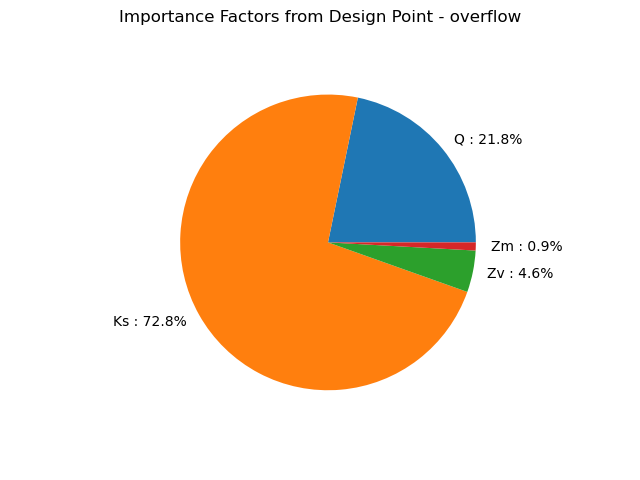Note
Click here to download the full example code
Estimate a flooding probability¶
In this example, we estimate the probability that the output of a function exceeds a given threshold with the FORM method. We consider the flooding model.
Define the model¶
from openturns.usecases import flood_model
import openturns as ot
import openturns.viewer as viewer
from matplotlib import pylab as plt
ot.Log.Show(ot.Log.NONE)
We load the flooding model from the usecases module :
fm = flood_model.FloodModel()
We load the joint probability distribution of the input parameters.
distribution = fm.distribution
We create the model.
model = fm.model
Define the event¶
Then we create the event whose probability we want to estimate.
vect = ot.RandomVector(distribution)
G = ot.CompositeRandomVector(model, vect)
event = ot.ThresholdEvent(G, ot.Greater(), 0.0)
event.setName('overflow')
Estimate the probability with FORM¶
Define a solver.
optimAlgo = ot.Cobyla()
optimAlgo.setMaximumEvaluationNumber(1000)
optimAlgo.setMaximumAbsoluteError(1.0e-10)
optimAlgo.setMaximumRelativeError(1.0e-10)
optimAlgo.setMaximumResidualError(1.0e-10)
optimAlgo.setMaximumConstraintError(1.0e-10)
Run FORM.
startingPoint = distribution.getMean()
algo = ot.FORM(optimAlgo, event, startingPoint)
algo.run()
result = algo.getResult()
standardSpaceDesignPoint = result.getStandardSpaceDesignPoint()
Retrieve results.
result = algo.getResult()
probability = result.getEventProbability()
print('Pf=', probability)
Out:
Pf= 0.0005340887806479517
Importance factors.
graph = result.drawImportanceFactors()
view = viewer.View(graph)
plt.show()

Total running time of the script: ( 0 minutes 0.050 seconds)
 OpenTURNS
OpenTURNS